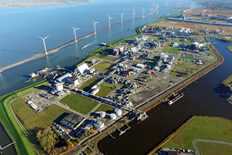- The consortium will receive an €11-million European grant for a green hydrogen project in Delfzijl.
- The 20 MW electrolyzer will convert renewable electricity into 3,000 tons of green hydrogen per year.
- BioMCN will use the hydrogen to produce renewable methanol, reducing CO2 emissions by up to 27,000 tons annually.
- Nouryon and Gasunie plan to decide on the final investment for the plant in 2020.

Project Overview
A consortium including Nouryon, Gasunie, Hinicio, McPhy, BioMCN, and DeNora has secured an €11-million European grant for a green hydrogen project in Delfzijl, the Netherlands. This initiative aims to significantly reduce carbon emissions and contribute to a sustainable, circular economy.
Funding and Support
The grant is provided by the Fuel Cells and Hydrogen Joint Undertaking (FCH-JU), a partnership between the European Commission and industry. Additionally, the project has received €5 million in subsidies from Waddenfonds, which invests in projects in the northern Netherlands.
Technical Details
The project will feature a 20-megawatt (MW) electrolyzer, owned and operated by Nouryon and Gasunie. This will be the first large-scale electrolyzer of its kind in Europe, converting renewable electricity into 3,000 tons of green hydrogen annually. McPhy will supply the alkaline electrolysis technology, while BioMCN will use the hydrogen to produce renewable methanol, reducing CO2 emissions by up to 27,000 tons per year. DeNora will provide the necessary electrodes for the electrolysis process.
Future Plans
Nouryon and Gasunie plan to make a final investment decision for the plant in 2020. They are also exploring options to increase the plant’s electrolyzer capacity from 20 MW to 60 MW, aiming to produce sustainable jet fuel in collaboration with other partners.

